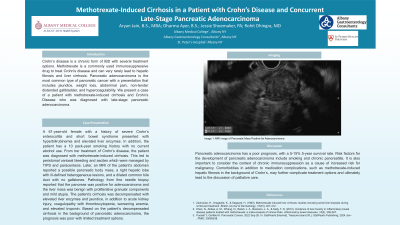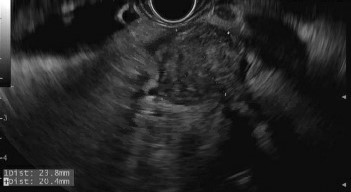Sunday Poster Session
Category: Biliary/Pancreas
P0110 - Methotrexate-Induced Cirrhosis in a Patient with Crohn's Disease and Concurrent Late-Stage Pancreatic Adenocarcinoma
Sunday, October 27, 2024
3:30 PM - 7:00 PM ET
Location: Exhibit Hall E

Has Audio

Aryan Jain, BS, MBA
Albany Medical Center
Albany, NY
Presenting Author(s)
Aryan Jain, BS, MBA1, Dharma Ayer, BS1, Jessie Shoemaker, PA2, Rohit Dhingra, MD2
1Albany Medical Center, Albany, NY; 2Albany Gastroenterology Consultants, Albany, NY
Introduction: Crohn’s disease is a chronic form of IBD with several treatment options. Methotrexate is a commonly used immunosuppressive drug to treat Crohn's disease and can very rarely lead to hepatic fibrosis and liver cirrhosis. Pancreatic adenocarcinoma is the most common type of pancreatic cancer with a presentation that includes jaundice, weight loss, abdominal pain, non-tender distended gallbladder, and hypercoagulability. We present a case of a patient with methotrexate-induced cirrhosis and Crohn’s Disease who was diagnosed with late-stage pancreatic adenocarcinoma.
Case Description/Methods: A 61-year-old female with a history of severe Crohn’s enterocolitis and short bowel syndrome presented with hyperbilirubinemia and elevated liver enzymes. In addition, the patient has a 10 pack-year smoking history with no current alcohol use. From her treatment of Crohn's disease, the patient was diagnosed with methotrexate-induced cirrhosis. This led to peristomal variceal bleeding and ascites which were managed by TIPS and paracentesis. Later, an MRI of the patient’s abdomen reported a possible pancreatic body mass, a right hepatic lobe with ill-defined heterogeneous lesions, and a dilated common bile duct with no gallstone. Pathology from fine needle biopsy reported that the pancreas was positive for adenocarcinoma and the liver mass was benign with proliferative granular components and mild atypia. The patient’s cirrhosis was decompensated with elevated liver enzymes and jaundice, in addition to acute kidney injury, coagulopathy with thrombocytopenia, worsening anemia, and elevated troponin. Based on the patient’s decompensated cirrhosis in the background of pancreatic adenocarcinoma, the prognosis is poor with limited treatment options.
Discussion: Pancreatic adenocarcinoma has a poor prognosis, with a 5-15% 5-year survival rate. Risk factors for the development of pancreatic adenocarcinoma include smoking and chronic pancreatitis. It is also important to consider the context of chronic immunosuppression as a cause of increased risk for malignancy. Comorbidities in addition to medication complications, such as methotrexate-induced hepatic fibrosis in the background of Crohn’s, may further complicate treatment options and ultimately lead to the discussion of palliative care.

Disclosures:
Aryan Jain, BS, MBA1, Dharma Ayer, BS1, Jessie Shoemaker, PA2, Rohit Dhingra, MD2. P0110 - Methotrexate-Induced Cirrhosis in a Patient with Crohn's Disease and Concurrent Late-Stage Pancreatic Adenocarcinoma, ACG 2024 Annual Scientific Meeting Abstracts. Philadelphia, PA: American College of Gastroenterology.
1Albany Medical Center, Albany, NY; 2Albany Gastroenterology Consultants, Albany, NY
Introduction: Crohn’s disease is a chronic form of IBD with several treatment options. Methotrexate is a commonly used immunosuppressive drug to treat Crohn's disease and can very rarely lead to hepatic fibrosis and liver cirrhosis. Pancreatic adenocarcinoma is the most common type of pancreatic cancer with a presentation that includes jaundice, weight loss, abdominal pain, non-tender distended gallbladder, and hypercoagulability. We present a case of a patient with methotrexate-induced cirrhosis and Crohn’s Disease who was diagnosed with late-stage pancreatic adenocarcinoma.
Case Description/Methods: A 61-year-old female with a history of severe Crohn’s enterocolitis and short bowel syndrome presented with hyperbilirubinemia and elevated liver enzymes. In addition, the patient has a 10 pack-year smoking history with no current alcohol use. From her treatment of Crohn's disease, the patient was diagnosed with methotrexate-induced cirrhosis. This led to peristomal variceal bleeding and ascites which were managed by TIPS and paracentesis. Later, an MRI of the patient’s abdomen reported a possible pancreatic body mass, a right hepatic lobe with ill-defined heterogeneous lesions, and a dilated common bile duct with no gallstone. Pathology from fine needle biopsy reported that the pancreas was positive for adenocarcinoma and the liver mass was benign with proliferative granular components and mild atypia. The patient’s cirrhosis was decompensated with elevated liver enzymes and jaundice, in addition to acute kidney injury, coagulopathy with thrombocytopenia, worsening anemia, and elevated troponin. Based on the patient’s decompensated cirrhosis in the background of pancreatic adenocarcinoma, the prognosis is poor with limited treatment options.
Discussion: Pancreatic adenocarcinoma has a poor prognosis, with a 5-15% 5-year survival rate. Risk factors for the development of pancreatic adenocarcinoma include smoking and chronic pancreatitis. It is also important to consider the context of chronic immunosuppression as a cause of increased risk for malignancy. Comorbidities in addition to medication complications, such as methotrexate-induced hepatic fibrosis in the background of Crohn’s, may further complicate treatment options and ultimately lead to the discussion of palliative care.

Figure: Figure 1: MRI Image of Pancreatic Mass Positive for Adenocarcinoma
Disclosures:
Aryan Jain indicated no relevant financial relationships.
Dharma Ayer indicated no relevant financial relationships.
Jessie Shoemaker indicated no relevant financial relationships.
Rohit Dhingra indicated no relevant financial relationships.
Aryan Jain, BS, MBA1, Dharma Ayer, BS1, Jessie Shoemaker, PA2, Rohit Dhingra, MD2. P0110 - Methotrexate-Induced Cirrhosis in a Patient with Crohn's Disease and Concurrent Late-Stage Pancreatic Adenocarcinoma, ACG 2024 Annual Scientific Meeting Abstracts. Philadelphia, PA: American College of Gastroenterology.
